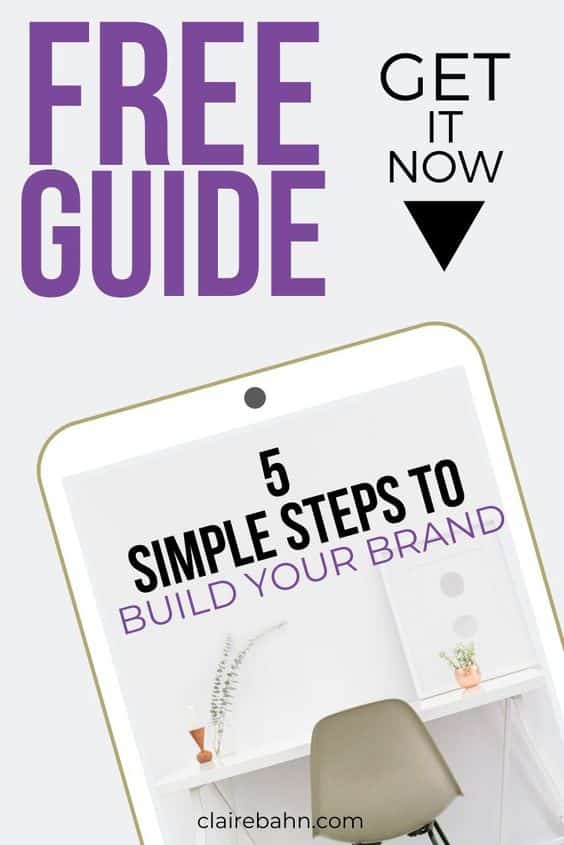Building your brand is easier than it sounds. Sure, there are layers to getting it done (and getting it done right), but if you lay out your strategy, I promise you that everything will click.
Sometimes I find it ironic that I — someone who comes from working with Fortune 500 companies — became a personal brand coach. I was surrounded by industry leaders who didn’t have their own website, their own blog, or even their own social media presence.
Social media is actually the reason why personal branding is important. We’re seeing this now more than ever. Ten years ago, you could send out a (seemingly) harmless Tweet not knowing that in a decade or so, people would be calling you out on your thoughts. This is what is currently known as “cancel culture.”
Do you want to attract more clients and boost revenue?
And if you think this can’t happen to you, remember that it has even happened to Fortune 500 CEOs. Just take a look at Mike Jeffries, the former CEO of Abercrombie and Fitch. A 2006 interview resurfaced 7 years later in 2013. His viewpoints did not and do not resonate well with the current cultural climate, and the scandal led to his resignation from the billion-dollar company. Even more recently, household names such as J.K. Rowling and Elon Musk have come under fire for their political remarks on Twitter.
You Are Your Brand
What these notable figures failed to understand is that they are their own personal brand. Anything and everything you say (past, present, and future) can leave a lasting effect on your business. That’s why it’s vital that you fully understand the impact of your personal brand as you start building it. For example, do you already have social media accounts? Have you said something that could come across as offensive to the general public? You might not want to start here with your personal brand.
If you haven’t even laid out the blueprint for your personal brand, use these next five steps as a blueprint for building your brand.

Step 1: Know Your Why
Building your brand begins and ends with your why.
Your “why” defines your daily motivation. If you’re clear on your purpose, then you can harness that energy every day to push yourself to succeed in your business.
But here’s the thing about knowing your why: it has to be laser-focused.
Your why should never serve as a blanket statement or vanity purpose. When you ask yourself why you’re building your personal brand, stay clear of statements such as, “I want to be rich,” or “To be my own boss.”
Use your imagination when determining your why. It should reflect on your values, morals, and overall aspirations in life.
If it sounds like a tall order, it’s because it kind of is. Going into business is a big deal, and building your brand is the first step to ensuring that your business thrives. Take some time to evaluate your true goals.
Ask yourself these questions help you get started:
- At what point did you decide to start your own business?
- What was the catalyst, the driving factor, that pushed you to take your first steps?
- What are you struggling with now?
- What type of content are you posting?
- Why are you posting that specific type of content?
- Who are you trying to help and why?
- What type of person do you see yourself as in 5 years?
Dig Deep
Your why should be the mission statement that drives you to answer and fulfill all of these questions. Your personal brand statement can easily fit these criteria. Your why will, naturally, highlight your personal goals, but it should also benefit and define your ideal client.
I’ll use myself as an example. My personal brand statement is, “I help my clients build compelling personal brands to skyrocket their business and sales.”
This simple statement answers all of the questions above. I started my personal brand business to help others’ skyrocket their business. I knew I wanted to do this after building my own brand. My content is centered around branding tips because I want to help my clients’ understand the power of a compelling personal brand. This helps present me as an expert in this industry, which is my personal goal.
See? With your why in mind, you’ll have the motivation to pursue your business goals because it can guide you on how to get there.
By answering all of these questions, you’ll know how to move forward with your brand. You’ll be able to set up a content strategy that not only speaks to your ideal client but one that speaks to your own purpose.
RELATED: Why Is Personal Branding Important to Your Business and Your Career?
Step 2: Niche Your Expertise
What industry are you in? Are you a personal trainer, a business coach, or a financial advisor? Go ahead and Google your title and see how many results pop up. You can even add your own city next to your title to see how much competition you have locally.
Instead of regurgitating the same information as your competitors, niche down on your area of expertise. You can do this in one of two ways:
1. Niche down your ideal client
Many people are hesitant to do this and for good reason. Limiting yourself to only serve a single group of people means you’re limiting how quickly and how much your business can grow. Instead, try niching down your ideal client to a couple of options so that you can target your content towards people who will resonate with your statement (a.k.a your why).
2. Become a thought leader
A thought leader is someone who brings innovative ideas into their industry’s mindset. These are people who think outside the box and present new concepts or ways of doing things that might be outside of what’s expected of them.
Forbes defines a thought leader as, “an individual or firm that prospects, clients, referral sources, intermediaries and even competitors recognize as one of the foremost authorities in selected areas of specialization, resulting in its being the go-to individual or organization for said expertise.”
This is exactly what you want with your personal brand: to become the go-to individual for your expertise. The goal is to make your expertise stands out above the rest.
And you can do that by following steps 3-5.
https://www.instagram.com/p/CBUKI5XJ8mf/
Step 3: Get a Website
Most people recognize that a website is essential, whether you own a brick and mortar or have an all-encompassing business brand. However, even if your business has its own identity, you – the business owner – also need your own website.
This is the step where many people will hesitate. Why do you need your own platform if your company already has one? What are you going to do with it if you don’t have time to update your website with those vital SEO blogs? It is really worth the investment?
Your website is a reflection of you and how you do business. So it’s not a matter of what you’re doing with your website, but more so what others are doing with it. By others, I mean your target client, investors, and press. If you’re building your brand, it means you’re still building your reputation. If you want your business to get press or intrigue investors, they need to see the person behind the business. They’ll do this by looking through your website and through your social media. And if they can’t find anything, they’re going to move on to the next industry expert who doesn’t require them to do so much digging.
Being present for your customers (especially during 2020) is also going to help your drum up sales. Posting helpful tips on your website’s blog and/or regularly updating your products or sales is going to work passively to bring in more customers while simultaneously building your engagement to keep them coming back.
Upkeep For Your Website
Your website is more than just a landing page with your contact information and a list of achievements. Your website should be active if you want people to find you. This means writing weekly SEO blogs or rewriting your staple pages to add new information.
Suffice to say, your website is an ongoing part of your personal brand, just like social media. You can’t expect to gain traction by treating your website as a one and done project. You need to show up every week if you want your target audience to lean on you as the trusted individual in your industry.
Step 4: Get Started on Social Media
Once you have your website built, it’s time to sign up for social media. And remember, your past can creep up on you. So if you’re prone to sharing your stream-of-conscious thoughts, you might want to start fresh with your personal branding social media accounts.
I recommend signing up for at least 3 social media accounts. The ones you choose should be dependent on your industry. For example, photographers would do well on platforms like Instagram, while financial advisors would be better off on LinkedIn and Facebook. It’s worth doing a bit of research to see where most people in your industry dominate on social media.
Pro Tip: Make sure your social media handles are the same (or close) on every social media platform. This makes it easier for people to discover and interact with you on a regular basis.
RELATED: What Is Social Media Branding?
Determining A Content Strategy
Since you’ve already determined your why, outlining your content strategy should be super simple. Most people want to utilize their personal brand to inform, which means you need to brainstorm a list of topics that you can speak on that will help your ideal client.
Research your competition to make sure that you’re not just repeating advice that has been said a dozen times before. That doesn’t make you a thought leader. Instead, find out what key points other people are overlooking. Then, find a unique way to advertise this advice (video is huge right now) and share it with your audience. Engagement is key, so again, don’t just post and ghost your audience. You need to interact with them daily.
Another thing that most rising CEOs don’t realize is this: everything in your life is your personal brand. It’s not just about your work and displaying your expert advice. As Jim Joseph points out, “How we interact with people on a day-to-day basis does in fact determine their perceptions of us, as well as their reactions. This is true on the personal side as well as professional.”
People want to buy from other people, which means sharing your night out with friends, speaking about your home life, and sharing your past experiences is all detrimental to elevating your personal brand. Your social media content should reflect that. Make sure you’re leaving a few windows open every week for people to peek inside your daily life.
Step 5: Hire a Personal Branding Consultant
Once you have the basics down (your why, your niche, your website, and your social media strategy), hiring a personal branding consultant should be your next step. Most people won’t indulge in this type of service until they’re in the middle of controversy— one that could have been easily avoided if they had talked to a personal brand consultant in the very beginning.
As a consultant, it’s my job to make sure that all of your morals and your brand mission are aligned and properly displayed. I make sure you know who you want to target and why. The why, as we’ve seen from people like Mike Jeffries, could cause you backlash down the road. It’s also my duty to ensure that your brand comes across as professional and personable so that your audience will view you as someone they know and trust. Building your brand means creating a compelling space that can help your business and sales to skyrocket.
RELATED: Top 5 Benefits of Outsourcing For Your Business
Conclusion
Building your brand is easy… if you know where to start. I hope that these 5 steps can help you capture the motivation you need to redefine your personal brand so that it represents the best you for your business.




